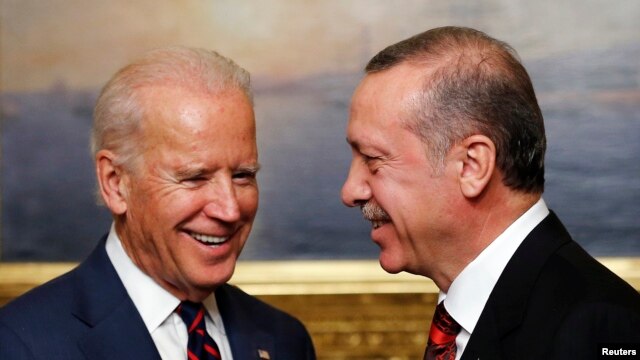Biden, Erdogan Discuss Syrian Regime Change
U.S. Vice President Joe Biden, left, meets with Turkey's President Tayyip Erdogan at Istanbul’s Beylerbeyi Palace, Nov. 22, 2014.
Last updated on: November 22, 2014 12:46 PM
ISTANBUL—
U.S. Vice President Joe Biden says he and Turkish President Recep Tayyip Erdogan have discussed a Syrian transition of power away from the Bashar al-Assad regime.
Biden described his more than four hours of talks Saturday with Erdogan as frank and direct. Though Washington and Ankara are divided over the strategy to fight Islamic State in Syria and Iraq, with Erdogan calling for a broader war against the militant group, relations between the allies remain strong, Biden stressed at a joint news conference.
"The depth and resolve of that partnership is strong as ties [have] ever been, in spite of the fact that the world and that we are collectively facing some difficult problems right now," Biden said.
Erdogan previously has insisted that if the United States wants Turkish help, it must focus less on fighting IS extremists and more on toppling the Assad regime. On Saturday, he said Turkey will continue working closely with the United States, and he called Biden's visit "very meaningful."
At the news conference, neither leader mentioned Erdogan’s other demands, including the creation of safe havens protected by no-fly zones in Syria. The Turkish president has ruled out the use of Turkey’s key airbases by the U.S.-led anti-Islamic State coalition until its demands are met.
Collaborating against jihadists
Biden said the allies were working together to stop Jihadists from using Turkey as a gateway to the conflict region.
"We are both attempting to stem, working together to stem the flow of foreign fighters to and from the battle fields of Iraq and Syria and to dry up their fighting,” the vice president said, “and we thank Turkey for its leadership in this regard."
Ankara has faced criticism for failing to do enough in the past to stop the militants.
Biden said the United States will continue to help Turkey cope with the humanitarian crisis created by 1.6 million Syrian refugees flooding into Turkish refugee camps.
Meanwhile, the White House announced the United States will give $135 million in additional humanitarian assistance to help Turkey and other nations care for refugees fleeing Syria's violence.
Most of that funding is slated for the World Food Program to use on household food rations and food vouchers for refugees. Nearly $11 million of the funds will go to support its efforts in Turkey.
Biden was scheduled to meet Sunday with Bartholomew, the Eastern Orthodox Church's Ecumenical Patriarch of Constantinople, before returning to Washington.
Goal of easing tensions
Observers say the main purpose of Biden’s three-day visit is to ease, rather than resolve, tensions between the allies over their ongoing differences
Biden, speaking earlier Saturday at a meeting of the nongovernmental organization Checks and Balances, warned of the dangers of government centralizing powers. Although he did not mention Turkey by name, the comment has been interpreted as being aimed at Erdogan, who has declared he wants more political power.
The vice president also called on Europe to diversify its energy supplies to reduce its dependence on Russia.
Speaking at an energy summit in Istanbul, Biden said "now" is the time to act. He said Ukraine's energy supply problems only underscore the urgency.
Russia has traditionally supplied Ukraine's east with gas, but cut off supplies in July in a dispute over Ukraine's unpaid debts. With the onset of winter, the supply issue has become increasingly tense, giving Russia more power in the dispute over eastern Ukraine.voa



No comments:
Post a Comment